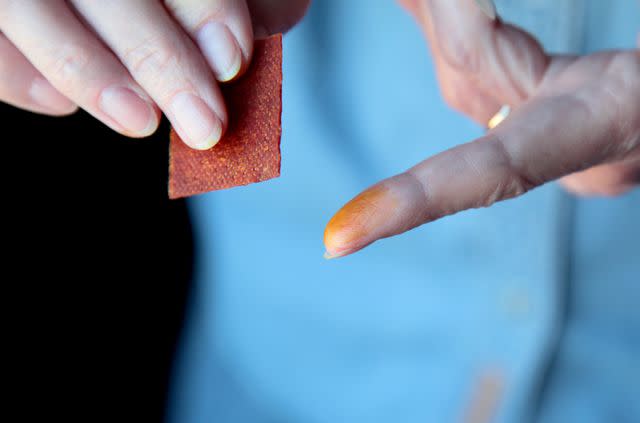Betadine vs. Iodine: What’s the Difference?
Medically reviewed by Mary Choy, PharmD
Betadine is an antiseptic medication containing an active ingredient called povidone-iodine that can be applied on the skin of an open wound. Povidone-iodine is able to disinfect open wounds after an injury.
Iodine itself is not a medication. It is an essential nutrient for your thyroid gland to produce hormones responsible for regulating your weight, body temperature, and growth.
While Betadine contains iodine, povidone-iodine does not provide the nutrients necessary to produce thyroid hormones. Rather, Betadine is used to clean open wounds to prevent the spread of infections. Iodine supplementation can help your thyroid gland provide enough iodine to produce the hormones necessary for our basic bodily functions.
This article will go over the differences between Betadine and iodine, including their uses, available forms, side effects, and more.

Getty Images / cstar55
What Is Betadine?
Betadine is an antiseptic solution whose active ingredient is the medication povidone-iodine.
Antiseptic solutions are applied to open cuts or wounds to prevent the risk of developing an infection. After cleaning the affected area with soap and water, gently apply Betadine to the cut or wound.
Once the solution is applied, iodine is released from povidone, where it is free to target any bacteria in the wound.
Betadine can be used to disinfect wounds on the skin. It is also applied to the skin to prepare it for surgery. Povidone-iodine is also available as a mouthwash to treat or prevent infections in the oral cavity (mouth).
What Is Iodine?
Iodine is a natural element necessary to produce thyroid hormones in our body. Unfortunately, our bodies cannot produce iodine alone, so we need to obtain this nutrient in our diet.
When consumed, iodine travels to the thyroid gland, where it is used to make thyroid hormone. Thyroid hormones help regulate weight, body temperature, energy levels, and growth. Without iodine, your body will be at an imbalance of these hormones.
Betadine vs. Iodine: Dosage and Availability
Betadine is an antiseptic medication used to clean wounds and prevent the growth of bacteria. Many forms of Betadine are available over the counter (OTC), such as a spray, dry powder, or liquid solution.
To use Betadine, apply it to the affected area after cleaning and let it dry. Applying Betadine to the area one to three times a day is recommended.
Iodine is an essential nutrient we must obtain from our diet to produce thyroid hormones.
According to the U.S. Institute of Medicine, the amount of iodine you need depends on your age and if you are pregnant or breastfeeding. For most adults, the Recommended Dietary Allowance (RDA) for iodine is 150 micrograms (mcg), but this can go up to 220 mcg and 290 for pregnant or breastfeeding people, respectively.
You can achieve your daily intake of iodine through iodine-rich foods, such as:
Iodized salt
Seaweed
Milk
Eggs
Fish
If food is not enough to meet these requirements, iodine supplements are an option. Iodine supplements, such as potassium iodide and sodium iodide, are available. These supplements come in various forms, such as capsules, tablets, or drops.
Side Effects
Betadine does not have many associated side effects. However, you can experience irritation to the skin around the application site after applying Betadine.
While iodine supplementation can help improve your thyroid function, too much iodine can lead to mild side effects like:
Nausea or vomiting
Diarrhea
Stomach pain
Safety Risks
There are no reports of severe toxic effects when using Betadine, although you may experience skin irritation with prolonged exposure.
When taking iodine supplements, it is important to use caution, as too much iodine can affect your thyroid gland and hormones.
Since the thyroid uses up iodine, people who have thyroid disorders can be sensitive to large amounts of iodine. Taking too much iodine can put you at risk of developing hypothyroidism, hyperthyroidism, or goiters.
Interactions
There have not been reports of drug-drug interactions (combinations of drugs to avoid) with Betadine. However, when testing for blood in the stool, using povidone-iodine can result in a false positive. A false positive is when the test says that there is blood in the stool, but there is not any blood in the stool.
The following drug, herb, and supplement interactions can occur with iodine supplements:
Combining iodine with anticoagulants such as Jantoven (warfarin) can decrease its anticlotting effects.
The use of lithium or bugleweed with iodine may result in suppressing thyroid hormones more than usual.
High doses of iodine can have an additive effect on certain drugs used to treat hyperthyroidism, such as methimazole.
Taking potassium iodide with angiotensin-converting enzyme (ACE) inhibitors, such as Lotensin (benazepril), and potassium-sparing diuretics, such as Aldactone (spironolactone), can put you at risk of high potassium blood levels (known as hyperkalemia).
Summary
Betadine (povidone-iodine) is an antiseptic solution used to disinfect open wounds or cuts and to prepare the skin for surgery.
Although Betadine contains iodine, it does not provide iodine supplementation necessary for thyroid function. Iodine is an essential element that is needed to produce thyroid hormones. You can get iodine as a nutrient from iodine-rich foods such as seaweed, fish, and milk or from supplements.
Despite both products containing iodine, Betadine and iodine supplements are used for different reasons. Always consult your healthcare provider on proper first-aid use of Betadine or adequate iodine intake to ensure safe and effective results.
Frequently Asked Questions
Is Betadine a form of iodine?
Yes. Betadine is a form of iodine called povidone-iodine. Povidone-iodine is used as an antiseptic to disinfect wounds after an open cut.
Who should not use Betadine?
Betadine should be avoided if you have a known allergy to iodine. In addition, you should not use Betadine if you previously had an allergic reaction to povidone-iodine.
Can you purchase Betadine or iodine over the counter?
Both Betadine and iodine supplements can be purchased over the counter at a pharmacy or drugstore.
Read the original article on Verywell Health.

